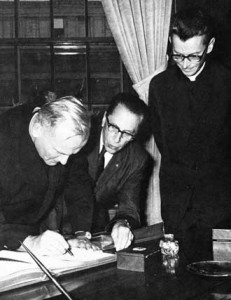
Former Polish diplomat taught French at McGill for 30 years
By Chris Chipello
If you’re visiting the McLennan-Redpath library buildings in the next couple of weeks, allow a few minutes to tarry in the main-floor corridor linking them. The modest exhibit of posters hanging there until Nov. 5 recounts the remarkable life of Tadeusz Romer. From 1948 until the late 1970s, he taught in the Department of French Language and Literature. But before becoming a McGill professor, he was a leading Polish diplomat – one whose career intersected with some of the most dramatic events of the 20th century, from the 1919 Paris Peace Conference and the restoration of Poland’s independence through the imposition of Soviet domination after World War II.
Romer was posted to Rome during Mussolini’s reign in the late 1920s and early ’30s. As Poland’s first Ambassador to Tokyo from 1937 until shortly before Pearl Harbor – and later from a post in Shanghai – he helped thousands of mostly Jewish refugees from Eastern Europe flee the approaching Nazi Holocaust via Siberia and East Asia. He later served as Ambassador to the Soviet Union during World War II, until diplomatic relations were suspended following the mass murder of Polish prisoners-of-war.
Romer then served as Minister of Foreign Affairs in the Polish government-in-exile in London. But with the entrenchment of Soviet power in Poland following the war, he found himself helping exiled Poles emigrate to lands such as Australia and Canada. Eventually, the Swiss-educated Romer accepted an offer to teach French at McGill.
He was at loose ends in London after the war,” said Therese Romer, his daughter. In Montreal, teaching became his second career. He developed a course on diplomatic usage, which was “largely French in those days,” and set up an intensive summer French school for McGill staff at the Gault Estate on Mont Saint-Hilaire.
Tadeusz Romer also maintained an active role in the Polish émigré community until his death in 1978. From 1962, he headed the Polish Institute of Arts and Sciences in Canada, an institution founded in 1943 by Polish academics who had taken refuge in Montreal. Housed since the 1960s in a greystone building on Peel Street between Sherbrooke and Dr. Penfield, the Institute includes a
McGill-affiliated library with a collection of interest to researchers in Polish art, history, literature and culture.
After the fall of Communism in Poland in 1989, a museum in Warsaw organized an extensive exhibition to acquaint the Polish public with Romer’s story. A shortened version of the exhibit, in poster form, was brought to Tokyo in 2008. The current display in McLennan-Redpath derives from that abridged version.
The 20th anniversary of the fall of Communism in Eastern Europe is also the subject of a two-day international symposium that wraps up today (Oct. 22) at Thomson House on McTavish Street. “From Totalitarianism to Democracy: Twisted and Unfinished Road,” organized by the Polish Institute and the Polish Academy of Arts and Sciences, is examining the transformation of the postcommunist countries and its impact in areas such as human rights and globalization.
